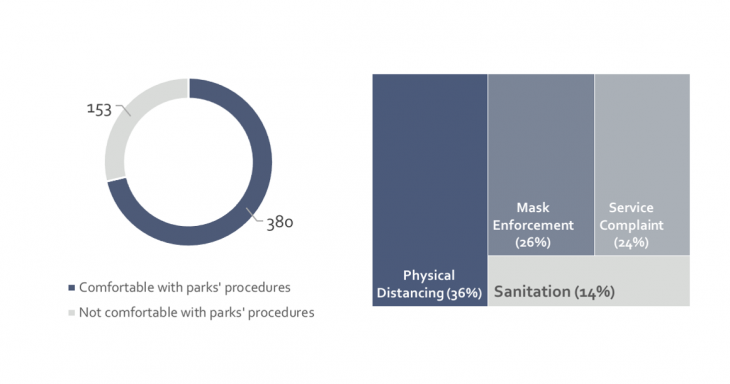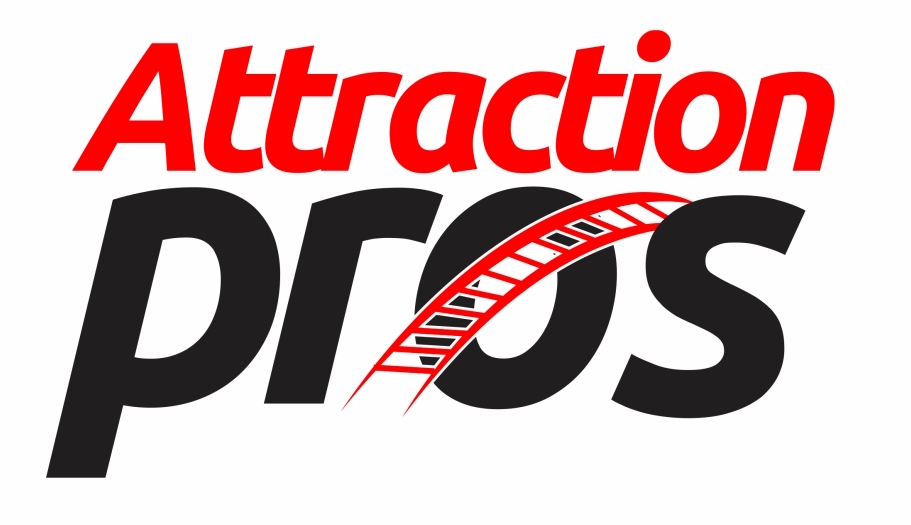
The First Six Months: How Guests Respond to COVID-19 Procedures in Theme Parks
How comfortable do guests feel with new policies put in place in theme parks?
Published December 2nd, 2020
Click here for the full report
This study takes a look at guests’ comfort level of procedures related to COVID-19 restrictions implemented after the initial shutdown in spring 2020. The analysis includes all online reviews from guests who indicated a subjective perception related to COVID-19 procedures posted on TripAdvisor for 16 theme parks (including water parks) in Central Florida. Specifically, reviews from Walt Disney World, Universal Orlando, SeaWorld Parks and Entertainment, Fun Spot America, Merlin Entertainments, and Premier Parks were utilized in the analysis.
The purpose of this research is to understand how guests perceive new procedures, including enforcement of wearing masks, physical distancing & crowd control, sanitation, and the manner in which these new initiatives are communicated by park staff. By understanding where guests’ top concerns lie, management can zoom in on specific areas that are recognized as priorities for improvement. While the industry continues adapting to the changing world, this research hopes to add much-needed clarity to the unknown, by providing a deeper understanding in how guests are reacting to the changes.
All data was collected from TripAdvisor reviews. No data was collected that is not already publicly available. The results are presented as aggregated findings, without any attention toward specific parks or operators.
This study aims to answer the following questions:
- How comfortable are guests visiting theme parks during the pandemic?
- How have guests’ comfort levels changed over the first six months of reopening after lockdown?
- What are the largest concerns guests have that they are expressing online?
- Are guests more comfortable visiting dry parks or water parks?
- How does comfort level in theme parks compare with rising or declining COVID-19 cases?
Click here for the full report
While the data indicates an overall positive sentiment, there is ample room for park operators to improve guests’ perceptions of how well new procedures have been implemented into operations. Because the data collected was from public sources, each review is likely convincing prospective guests to either visit or stay away from theme parks during this time. Previous studies have indicated that one negative review will turn away 30 potential customers, and given the safety-related nature of the reviews included in this analysis, that number is likely higher. The goal for all operators should be to provide experiences that are so satisfactory that the amount of compelling online reviews drown out and dilute the impact of any negative feedback.
Physical distancing and crowd control should be top of mind for operators due to both the data presented here along with the upcoming holiday season which is expected to bring in crowds; albeit less than traditional numbers, this is expected to continue to be top of mind for guests when they are visiting attractions. Parks must continue to demonstrate to guests that physical distancing is still a factor that is treated as a high priority.
Enforcement of masks is a two-pronged issue that is arguably the most sensitive. On one hand, the majority of reviews indicate that they favor mask enforcement and appreciate when they observe strong compliance from both guests and employees during their visit. On the other hand, it is critical that staff’s enforcement of mask compliance maintains existing service standards that the industry is known for. There are many other policies that staff regularly need to remind guests of over the course of their visit, including smoking in designated areas, not sitting or standing on handrails, and restrictions on outside food & beverage. Ensuring that guests are adhering to mask policies should be done with the same level of courtesy as any other policy, even if it may be stressful or overwhelming. When guests become frustrated with the way that policies are enforced, they can be less likely to comply.
Sanitation was the smallest concern that guests expressed, although opportunity for improvement still exists. The term “sanitation theater” became common as parks were developing reopening plans and the importance will remain long after the pandemic is over. The concept of sanitation theater suggests that the optics of your cleaning activities are just as a important as the cleaning activities themselves. The more guests see cleaning in action, the higher their perception of cleanliness goes up. If not, an empty hand sanitizer station may carry more weight in the guests’s mind if they did not observe other actions such as surfaces being wiped.
Lastly, bring your guests into the conversation. Ask for feedback regularly to determine what they consider to be the strongest factors that impact their decisions and their perceptions. Every guest visiting you now is confident in the procedures you’ve put in place to keep them safe, otherwise they wouldn’t have left the house. Your goal should be to not only meet, but regularly exceed their expectations.
Click here for the full report
Josh Liebman
Josh Liebman specializes in guest experience within attractions, tourism, and hospitality, including service standards, complaint resolution, and driving guest loyalty. Josh is a serial entrepreneur, podcaster, consultant, and speaker. Josh has worked for some of the top attraction operators in the world, including, but not limited to Walt Disney World, Universal Orlando, Merlin Entertainments, and Cedar Fair. Josh has been integral to the openings of multiple attractions in various leadership capacities. Additionally, Josh has consulted for many of the world’s leading hospitality brands, including Ritz Carlton, Four Seasons, Waldorf Astoria, and many more. Josh is Co-Host of the AttractionPros Podcast, which brings the audience into the room with the top leaders, executives, and influencers in the attractions industry.
